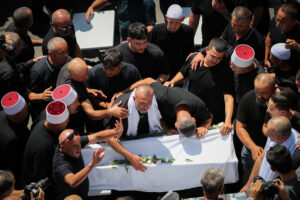Israel’s security cabinet has authorized Prime Minister Benjamin Netanyahu and his defense minister to decide when and how to retaliate against what Israel and the United States have described as a rocket attack by the Lebanese Shiite group, Hezbollah.
Ministers gathered for an emergency session on the Israeli-occupied Golan Heights after Saturday night’s attack that killed 12 children and teenagers from the Druze community. Hezbollah has denied any wrongdoing.
The strike was the deadliest cross-border incident in the month of exchange of fire between Israel and the Iranian-backed group.
The attack fueled fears that the hitherto relatively subdued hostilities could escalate into a full-scale war.
Western governments are calling on Israel to apply restraint in its response. The White House said it was in “continuous discussions with Israeli and Lebanese counterparts since the horrific attack” in the Druze town of Majdal Shams.
It added that it was “also working on a diplomatic solution along the Blue Line [the unofficial frontier between Israel and Lebanon] that will end all attacks once and for all”.
On Monday morning, an Israeli drone attack near the Lebanese town of Shaqra, about 6.5 kilometers from the Israeli border, killed two people, Lebanese state media reported. Hezbollah said two of its fighters were killed. Israel did not comment on the report.
Meanwhile, Air France has become the latest airline to suspend flights to and from Beirut as expectations of reprisal attacks from Israel grow. Lufthansa, Swiss International Air Lines and Eurowings have also followed the same path. The funeral of the young victims took place in Majdal Shams on Sunday amid raw grief.
Thousands of people gathered as coffins dressed in white were carried through the city.
The attack is the most devastating for the Druze community that has lived in the Golan Heights for hundreds of years. They are part of an Arabic-speaking ethnic and religious group located in Lebanon, Syria, Golan Heights and northern Israel.
Residents of the Israeli-occupied Golan Heights have been under Israeli control since Israel conquered the area from Syria in the 1967 war, although many retain their allegiance to Syria. About 21,000 people live on the rocky plateau, of which about 20% have accepted Israeli citizenship.
The attack on Majdal Sham sparked outrage in Israel and the Druze community, about 110,000 of whom also live in Israel.
Netanyahu cut short a visit to the United States to return to Israel after the attack. Before summoning the security minister on Sunday, he met with defense officials.
After the hour-long meeting, the prime minister’s office released a brief statement that said “members of the Cabinet authorized the prime minister and the defence minister to decide on the manner and timing of the response against the Hezbollah terrorist organization”.
Earlier in a condolence speech for Sheikh Muafak Ṭarif, the spiritual leader of Israel’s Druze community, Netanyahu said Hezbollah would “pay a heavy price for this that it has not paid to this point”.
Hezbollah strongly denied being responsible for the attack and reportedly blamed an Israeli interceptor missile for the bloodshed.
Israel’s military Chief of Staff, Lieutenant General Herzi Halevi, said in a statement on Sunday that the Israel Defense Forces (IDF) knew “exactly where the rocket was launched from”.
General Halevi identified it as an Iranian-made unguided Falaq surface-to-surface missile with a 53 kg warhead.
“This is a Hezbollah rocket. And whoever launches such a rocket into a built-up area wants to kill civilians, wants to kill children,” he said.
Previously sporadic fighting between Israel and Hezbollah escalated after Hezbollah fired rockets at Israeli positions a day after Hamas’ deadly attack on Israel on October 7. Hezbollah claims it is acting in support of the Palestinians.
Source: BBC News 


